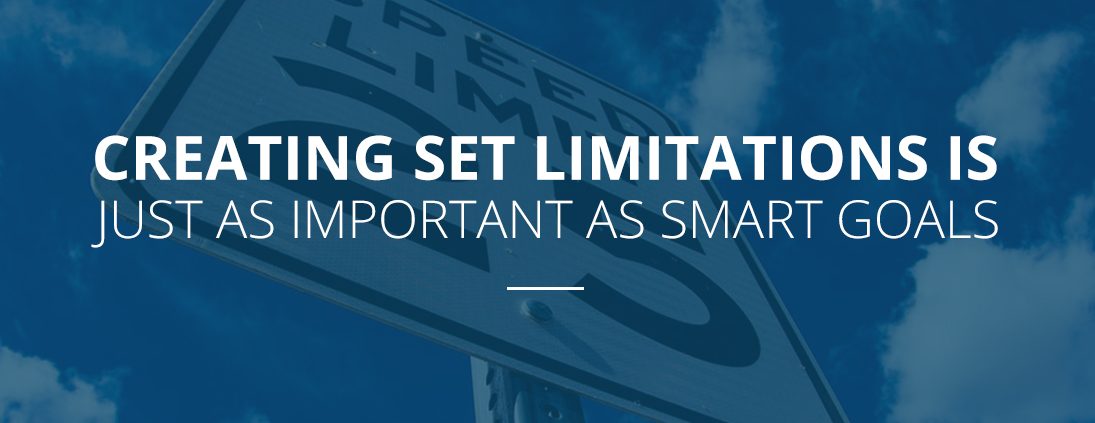Creating SET Limitations Is Just As Important As SMART Goals
As a marketing agency, we start our strategic engagements with SMART business goals. Many companies are coming to the table with fantastic goals, and the rest are excited to work on creating those goals together.
Just to reiterate, SMART goals are:
- Specific
- Measurable
- Achievable
- Results-focused
- Timebound
But when we start a business engagement, learning or helping to determine your goals is just the first step. A great marketing partner also needs to know your limitations.
But why? It can be frustrating for successful business owners to hear questions about their limitations. After all, if you’re great at what you do, why bring up something that’s holding you back?
Discussing limitations gets the truth out in a more comfortable way
Avoiding talks about limitations when starting a marketing engagement is just putting a bandaid over a tough question. Since discussing limitations can be awkward, we’re often tempted to ignore it to save the relationship. It seems like the issue will figure itself out anyway, but it often doesn’t.
What makes it appear like the issue will resolve on its own? To answer that, let’s talk about the first two limitations that will help an agency partner serve you best:
- Your timeline
- Your budget
If you’re a business owner, you might think that we already know the answer to both: We want this done as soon as we’re ready for as little as possible.
This puts an imperative on the marketing partner to suggest things like a start date and total budget without your participation. There’s probably an actual date range you would be willing to start within and a budget you can spend. Even if the truth only comes out when the agency pitches you dates and dollars, it’ll happen at some point.
After all, the agency’s priority is to help you meet your objectives, and if that will require a significantly smaller or larger budget than you have in mind, the conversation may become uncomfortable. The same goes for timelines, which may be compressed or expanded, rushed or delayed more than you’d like.
The guessing can all be prevented. How? You already know your limitations.
Ah, but perhaps you’re holding the information back to facilitate negotiations. You definitely don’t want a greedy marketing agency inflating the price or adding in filler work just because you threw a large number out there.
Unfortunately, that’s not how it works.
Transparency saves time and money
If you’re using vagueness as a negotiating tactic, be aware that good marketing consultants aren’t selling you a manufactured good, like a car or a phone, for which you can lower or raise the price without changing the deliverable.
When the budget decreases, the total amount of marketing services received decreases, so it’s best to discuss openly whether your limitations (budget) will prevent meeting your goal (revenue.)
On the other end, good marketing agencies will never inflate their prices to meet your budget; experienced marketing agencies expect you to price shop, and they know that they cannot remain competitive when gouging prices.
Goal-oriented marketers will also not encourage you to conduct frivolous marketing just to max out your budget. And for everyone’s sake, they’ll be up front about their team’s bandwidth to fulfill the marketing when your budget is relatively high, too.
Of course, there’s almost always more useful marketing that can be done, but the important conversation should focus on return on investment and pacing. When additional marketing activities won’t get you closer to you goals, good agencies will tell you so.
If the budget isn’t a good fit, save yourself time and money and simply look around for other potential marketing partners who work in your range. Transparency is best for everyone, both mentally and financially!
How can I best share my limitations?
We’re glad you asked! Luckily, almost all businesses share the same boundaries, which we can provide:
- Timeline: when the work must be done, including start dates, end dates, and speed of execution in between.
- Budget: how much the work must cost, including minimums, maximums, billing frequency, and whether work can be done as projects or hours.
- Values: the unquantifiable objectives that your company serves, such as a commitment to the environment or the values of a specific religion.
- Expectations: the things that must or must not be done in pursuit of your objectives that would likely come up, such as a mandate to use Facebook for marketing or refusal to use paid advertising
So how do we know if we’re communicating our boundaries well?
We have a helpful acronym for that. SET limitations are easier to create than SMART goals (two letters easier, in fact.) We could define SET limitations as being a little different from our goals:
- Specific: Provide dates, numbers, or detailed descriptions of what must or must not be done in pursuit of your goals when possible.
- Enduring: Provide limitations that you could imagine sticking to so you don’t create a moving target.
- Transparent: Tell your real limitations up front rather than hiding or altering information out of emotion or as a negotiating tactic.
That’s it. Share your goals, work through your limitations, and kick off a stellar marketing engagement!




Leave a Reply
Want to join the discussion?Feel free to contribute!